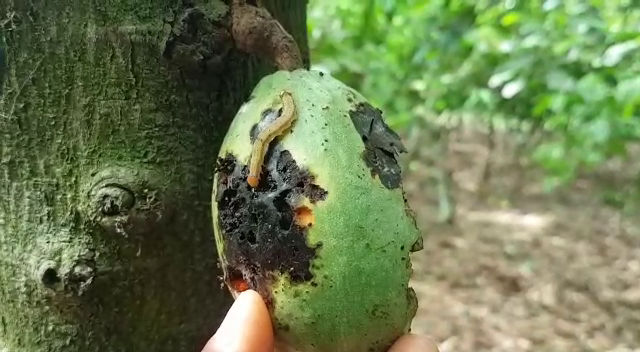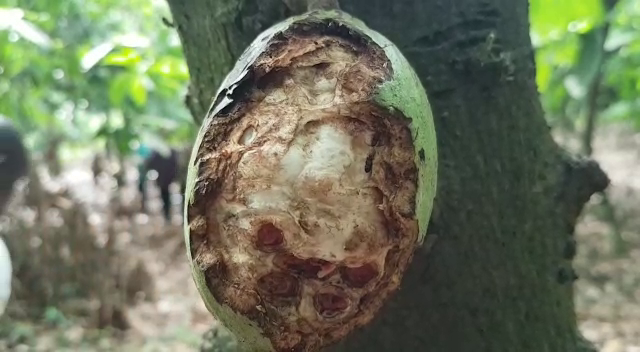
Ghana has confirmed that farms across the country have been affected by the invasion of fall armyworms, a pest that is causing huge damage to crops across the continent and threatening food security.
The pests have destroyed more than 1,370 hectares of maize, cowpea and cocoa farms in the Brong Ahafo, Ashanti and western regions of the country so far this year, according to the agricultural ministry. Fall armyworms destroyed 4,500 hectares of farmlands in Ghana last year.
Fall armyworms, which originated in the Americas, had never been seen on the African continent before last year. But since then, Nigeria, Zambia, Zimbabwe, Kenya and other African nations have seen the pests invade farms.
Nii Okai Hammond, a Ghana consultant for the international Food and Agriculture Organization (FAO), said the pests have destroyed 90,000 hectares of maize in Zambia, 130,000 hectares in Zimbabwe, and 87,000 hectares in Kenya, which is in far excess of the level of destruction seen in Ghana.
The fall armyworm is not actually a worm. It is a hungry caterpillar that eats up crops before it turns into a moth. The adult moths lay their eggs on seedlings and plant leaves. Within five to 10 days, the caterpillars hatch and launch a massive onslaught on vegetation. They feed on several crops including, staple food sources like maize and cowpea.
Malawi also has been hit by the fall armyworm. Fortunately for farmers, the devastating pest reared its ugly head towards the end of the planting season, which normally runs from December to April. Still, the northern region of Malawi, which typically receives the rains last, was hardest hit, as were farmers in other regions who planted late.
The worm has devastated lots of maize plantations, which is a staple food for Malawi. Farmers report spraying their fields more than five times, to no avail, and have lost everything. One Malawi farmer indicated that this is one of the most devastating maize pests that he has ever come across, and he is scared to think what will become of his family this year considering he has harvested nothing. Farmers who use irrigation during the dry season are afraid to plant for fear of losing their crop.
The Malawi Ministry of Agriculture acknowledges that it is aware of the problem and that it is doing everything to ensure that the next planting season is free from this problematic worm. The Ministry admits that it is a very difficult pest to manage as it requires a combination of different chemicals to be successfully eradicated, and most smallholder farmers cannot afford to purchase the pesticides. It s apparent that smallholder farmers in Malawi who depend on maize for their livelihood will face serious difficulties in the next planting season if the armyworm is not taken care of immediately.
The Ghana Agricultural Ministry says it will need 16 million cedis ($4 million) to fight the outbreak, half of which will go into the purchase of chemicals, with the remainder being used on education.
The Ghana government has established the National Taskforce for the Control and Management of the Invasion. Taskforce members include the Veterinary Services and National Disaster Management Organization, among others.
Its mandate includes sensitizing farmers and making them aware of the symptoms of armyworm attacks so they can report infestations to authorities. The taskforce will mobilize groups to visit and monitor farms for early detection of attacks, and the team will take measures to stop the current spread. The taskforce also is expected to undertake research for long-term measures to combat the worm, including biological controls using insects that prey on the pests.
We want to remove this [pest] permanently, and so all the measures that are required to ensure this does not occur again after this control, we are putting in place, Dr. Akoto Owusu Afriyie, Ghana’s minister for food and agriculture, told a media briefing in Accra.
We have to take very sharp remedial action in order to stop the spread and also eliminate the incidence from our fields, he added. The issue is being treated as an emergency, and he has informed the cabinet and the office of the president about the need for immediate release of funds to deal with the problem.
Even before the money is released, the minister says the Chemical Dealers Association of Ghana has agreed to release pesticides to the government on credit. He is confident the chemicals will help deal with the pests.
The experience we gained from last year is that armyworm is very sensitive to the chemicals that we are going to apply and we are confident that once we have adequate application, we will be able to eliminate the danger, he explained.

Farmers, particularly those growing cocoa, have been lamenting the destruction caused by the pests on their farms. Thomas Muller, a farmer in the Ejisu Juabeng municipality of the Ashanti Region, said they are seeing increased attacks by the pests this year on the cocoa fields.
The pests have created holes in the cocoa leaves and destroyed the pods, he said. Even if you apply chemicals to them, they do not die. They like the cocoa because it is sweet. Government should step in and help us because Ghana is cocoa and cocoa is Ghana.
The Peasant Farmers Association of Ghana is warning that the country s ongoing efforts to achieve food security are at risk as a result of the armyworm invasion.
“The farmers don’t really know what to do, Charles Nyaaba, the association s program officer, said. It is so massive that even if one farmer should spray his farm, the disease will still spread to the other farms. One person cannot control it so we need mass spraying exercise.”
The Ministry says a mass spraying exercise to be undertaken in the coming days will help farmers deal with the problem.
The FAO is commending Ghana for its swift action in setting up the taskforce. We are talking about very huge things that could happen, Hammond said of the emerging situation in Ghana. If at 1,000 to 4,000 hectares [of destruction], we are putting a taskforce together, I should say this is very timely.
Katherine Chaweza contributed to this report from Malawi.
